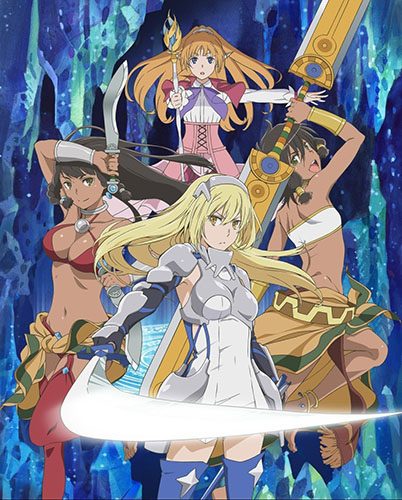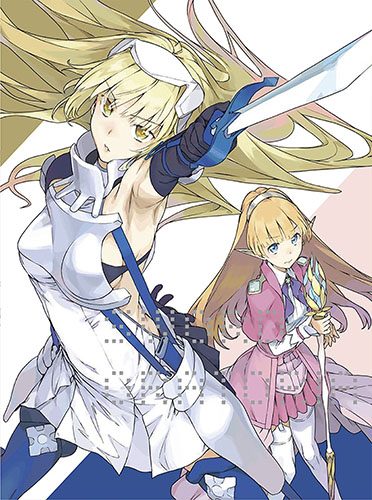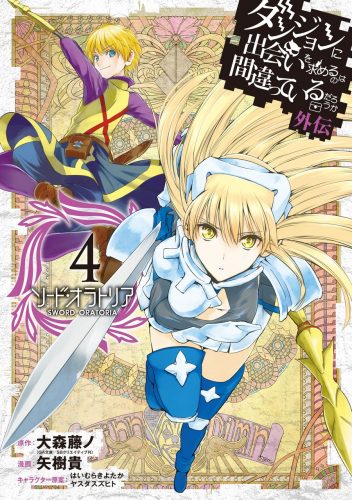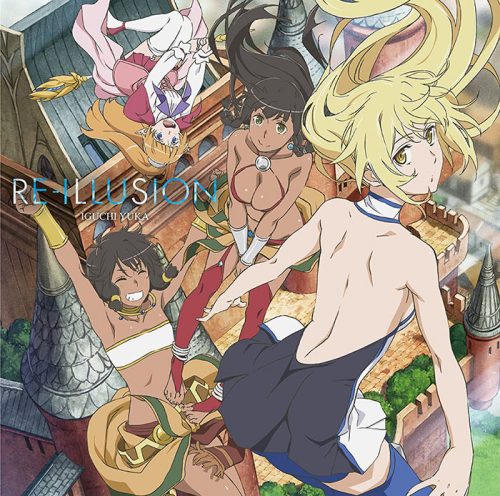
Ais front and center.
- Episodes : 12
- Genre : Action, Adventure, Fantasy
- Airing Date : April 2017 - July 2017
- Studios : J.C.Staff
Contains Spoilers
Dungeon ni Deai wo Motomeru no wa Machigatteiru Darou ka Gaiden: Sword Oratoria Introduction and Story (Spoilers)
Affectionately shortened to DanMachi, Sword Oratoria is the parallel side story of the main series which premiered in 2013. Instead of focusing on Bell Cranel’s rise from zero to hero, it focuses on the already exceptionally gifted Ais Wallenstein. Viewers will of course remember her as Bell’s crush and mentor from DanMachi, who just so happened to save his life, much to his embarrassment. Sword Oratoria takes place shortly prior to the two’s first encounter, and finishes up at exactly where 2013’s story ended. While there isn’t anything new added to Bell Cranel’s story, the show expands on the world of Orario, and shows that there’s a lot more going on in the world than we originally thought. Powerful forces that Bell couldn’t hope to fend off are at work, and most of them could very easily kill the young warrior with little effort. Sword Oratoria is a show that highlights the powerful adventurers that brave the furthest reaches of the dungeon, and make their living doing so.
While the sword princess Ais is definitely the star of this adventure, the story unfolds mainly from the viewpoint of her meek, affectionate admirer Lefiya. Lefiya is an elf mage in training within the Loki Familia. Unfortunately, she herself is having a tough time, causing her to rely quite a bit on Ais. On their expeditions, the Loki Familia comes to encounter strange new monsters that are cropping up within the dungeon. During the Monsterphilia event, they even manage to escape Babel and attack Orario itself. A mysterious figure that claims to know Ais reveals herself, and sets the stage for a power play involving more evil than good.
What We Liked About Dungeon ni Deai wo Motomeru no wa Machigatteiru Darou ka Gaiden: Sword Oratoria
The original DanMachi series has a wide variety of likable characters, so the nice thing about Sword Oratoria is seeing a lot of familiar faces with much more screentime. There are also quite a few new characters as well. The backstory of background characters, mainly the Loki Familia, is explored, and we also learn a bit about the antagonist characters, Ottarl and Freya, from DanMachi.
The biggest difference in Sword Oratoria, however, is the action. At the end of DanMachi, Bell Cranel was level 2, more than a rookie, but far from experienced. The Loki Familia is full of powerful veterans, and as such, they get into much more fierce battles. Familiar strong enemies like the Minotaurs are dealt with like level 1 slimes in a JRPG. The veteran trio of the Loki Familia, captain Finn, Riveria, and Gareth, are also revealed to be strong level 6s. Seeing them battle Ais’ nemesis Revis in episode 5 was a highlight of the season.
Lefiya, a former background character herself, is a likable protagonist. She is almost like a less capable Bell, earnest and hardworking, but her payout doesn’t come until late in the season. Together with Ais and the amazonian twins Tione and Tiona, they dominate the majority of the show’s focus. It’s a pretty standard affair with cute girls doing cute things, but the fantasy and action elements keep it from getting too stale. Her interactions and jealousy of Ais’ growing affection for Bell instead of for her is also comical.
Discussion Time
I’m definitely not the only one who got excited when this was announced. After the excitement of DanMachi, I was ready, willing, and able for a second season. Sword Oratoria isn’t that, but it is a decent look at the interesting parts of the world. The cast is likable and the action is exciting. The story, however, feels like it’s spinning its wheels. Not to say it’s boring, but it starts so many new threads and introduces a number of starting points that it gets messy. If this was a series where I could expect to find 300 more episodes like Naruto, Fairy Tail or One Piece, I’d probably die of ecstasy. Unfortunately, 12 episodes that feel like they’re full of loose ends that go nowhere is a bit disappointing, even though they were exciting and humorous nonetheless.

1. A Highly Likeable Cast
You could dedicate an entire episode to almost every character shown and it would be entertaining. The world feels deep and full just from the faces in it. Bell Cranel, Hestia and Lili make guest appearances at certain points in Sword Oratoria, reminding the audience when certain events take place. It works well and it keeps the show from feeling too unfamiliar. So much of the events unfold in new locations that it would almost feel like a new show without familiar faces.
2. Solid Amount of Action

Even though we were well aware of how powerful Ais was from being able to completely wreck Bell with just the scabbard of her blade, we didn’t really get a true sense of her strength. The same goes for everyone else in the Loki Familia, and there are some strong fighters in there! In Sword Oratoria we see Ais’ wind magic for the first time and how she uses it in combat. We also see how these strong level 4 and up fighters take on strong enemies in great numbers. It’s not an exaggeration to say that, for a side story, it overshadows the original series in terms of fighting spectacle. It’s not quite as big a leap as Dragon Ball to Dragon Ball Z, but it does have a lot more intense fighting scenes for the cast.
3. The World Opens Up
There is a hidden hierarchy in Oraria, and it seems that the gods may not in fact be at the top of the food chain. A mysterious new power is introduced, one that seems to have ties with Ais. We are also introduced to Ouranos, who seems to be a kind of overlord of Babel and Oraria itself. Not to mention, adventuring is a much bigger deal than it was impressed in DanMachi. While many adventurers have their own reasons for going, the Loki Familia forges its expeditions for their livelihoods. After returning from their battles, the main cast often has to repair and pay heavy fees to blacksmiths for replacing their weapons. It adds more to the ecosystem seeing how items and adventures interact with those outside of the dungeon.
1. It Feels Detached & Unnecessary

As entertaining as Sword Oratoria is, there’s not a whole lot that feels like it ties into the main story. It feels like it’s its own series with its own characters that just happen to exist in the same universe. This would usually be fine, but as we’re all still waiting to learn the fate of the main series, starting afresh in another direction doesn’t seem like it will payoff. Sword Oratoria tries to be so new on its own that it ends up not really complimenting the existing series, but instead separating from it.
2. Too Many Plot Threads
For concurrent events, a lot of new enemies and side stories were started rather than simply expanding upon what we already knew. We’re first introduced to the mysterious Revis and her connection with the hybrid-type monsters appearing from deep in the dungeon. We also learn Ais has a backstory that ties into this somehow. Goddess Freya is plotting something, and Ouranos is orchestrating events from underneath Oraria. So much is going on, yet none of it is ever tied up or seems close to a conclusion by the end of the season. 12 episodes is too much for just a teaser, and we don’t know if we’ll ever see the adaptations of the conclusions to these numerous arcs.
Final Thoughts
Although this isn’t that sequel we wanted, that fact alone shouldn’t diminish the enjoyment there is to be had. The world is interesting and the characters are likable, so as a fan, I will take all I can get. I’d definitely prefer a DanMachi season 2 come sooner rather than later, but Sword Oratoria at least lets us know the franchise hasn’t been forgotten.
Did you enjoy DanMachi Sword Oratoria? Any favorite scenes from the show? We’d love to hear them! Let us know in the comments section, and place your bets as to when we’ll seen Bell Cranel and the Hestia Familia again!
Recommended Post
Danmachi: Sword Oratoria - Spring 2017
Recommended Post

